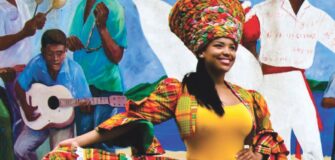Share
A few weeks ago, a friend of mine raised the concern that the 70th Anniversary of the BVI Emancipation Festival should be more than just an occasion for revelry, and that it should have some sort of recognition or thanksgiving for the event that brought about the end of Chattel Slavery in the British West Indies colonies, and the BVI in particular.
From my experience as a former Museum curator assistant at the original VI Folk Museum in Road Town, I can say that locals are not really interested in colonial history and spend very little time seeking information about the past. The museum was seen as a tourist attraction, not as a resource learning center for residents. It was never promoted for locals to learn and understand the past events that led to where we are today as a British Overseas Territory (BOT). Like other BOTs in the Caribbean, we share a common history of colonial control. But we also share the common responsibility of knowing what kind of society we would like to see in this 21st Century, and recognize that we have a part to play in determining how we go about the continued development of our island-nation, homeland to a diverse group of people who have migrated here over the centuries and decades.
GETTING THE RIGHT PERSPECTIVE
Forty years ago, the Territory celebrated 150 years since the emancipation of the enslaved population of the British colonies. This was in 1984. I was asked to write an article for the commemorative booklet, and I did. Unfortunately, I lost my copy of the booklet during the passage of Hurricane Irma in 2017, {along with other valuable books and personal documents). But I hope that somewhere in our archives and libraries we can still find evidence of this booklet having being published. The occasion was then, a celebration of the Emancipation Proclamation itself, and not a celebration of the celebration as we are having now. This 70th anniversary is a celebration of the festival, and not a celebration of the Emancipation event, per se. Let us be clear. I recall the subtitle of the aforementioned Booklet was: “From 1834 to 1984”. So from 1984 to 2024, being another 40 years, we should actually be celebrating 190 years since slavery was abolished in the British Caribbean Colonies.
The fact that we lose sight of how long ago slavery was abolished sets the stage for the ever so often, murmurings among some people who, when called to account for present day stagnation and lack of positive development moving forward, are quick to say that we are going back into slavery by the white man. This fear-mongering is a baseless excuse for not taking ownership of the responsibility for nation-building and all that it entails. There is nothing that the white man will do to us today that a black man has not done, or will not do, given the chance. Just setting back the clock on the emancipation celebration is an indication of the “forward never, backward ever,” mindset of some of the people who should be doing better than they are, with the power that they have.
THE MORE THINGS CHANGE….
The final thing I would like to say before I sign off on this subject is, that the pattern of the ruling class, regardless of colour, always tends to be the same. In 1834 when the enslaved people were set free, the planters on plantations in the larger colonies were worried about how they would continue to produce their sugar crops if they didn’t have the free labour they were accustomed to having. They feared that once the Blacks were given their freedom they would want to get as far away from the plantations as possible. If you were treated badly in a place you were forced to stay at, and got the opportunity to leave, wouldn’t you? So, yes, many of the freed peoples left. But not all. Those who remained were being asked to pay for their once free housing. The Plantation owners charged them high rents. The land they used to work for free for the plantation owner was now off limits to them, unless they rented it, or bought plots if they had the opportunity and could afford.
As soon as the planter class realized that they couldn’t work the African former enslaved for free they started looking elsewhere for cheap labour. They were advised by their government to look for cheap labour if they wanted to continue their sugar production. So they began to import Chinese and Indian indentured servants, along with the Portuguese, who would not only diversify the population in society, but compete with the former laborers they met in the Caribbean (particularly in places such as Trinidad, Jamaica and British Guiana). That’s how the racial heritage developed in those nations, and of course, because people are basically migratory by nature, they travelled and spread to other islands as well.
The BVI had less of the diversity in the past, but today, when we are having a booming economy? Immigrants are coming from all over and so we have the demand and competition for cheap labour which will be (as it already is) a contributing factor (and obstacle I might add), to decent wage increases for the labour class.
Where we go from here will be determined by how and if people are willing to face reality, accept the obvious, and have the courage to take necessary actions to stay afloat, even if the ship is going nowhere soon.
Yet, as our fore-parents have taught us to exercise wisdom and work hard for what we want, and leave other people’s business alone, we are to trust God. We can’t do anything about the past, but the future depends on how we conduct our business today, with ourselves and others, today.
With the availability of information and the use of the Internet, nobody has to be in the dark about history anymore. Speculation and useless blame-gaming benefits us nothing. We must continue to learn if we want to see positive growth, both at the personal and national levels.
Peace!
About the Author: Sandra Phillip Hodge (a.k.a. Ndigo Naka) is an accomplished Poet and a former Magazine and Newspaper Editor, whose interest in Caribbean History spans decades. She has made significant contributions to the awareness and development of contemporary Arts and Culture. She can be reached at sandraphilliphodge1@gmail.com. Or P.O. Box 4140, Road Town, Tortola, BVI VG1110



